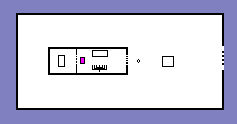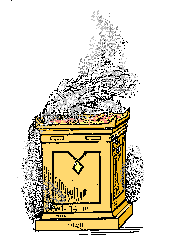
The text is discussed
in the next pages but seeing it all at once may be helpful. It is also
linked from the contents page for the chapter.
.
r06d
|
|
|
| .9 ¶ And when he had opened the fifth seal, I saw under the altar the souls of them that were slain for the word of God, and for the testimony which they held: | Fifth
seal The first four were about horses and their riders. The events
of seals five, six, and seven are different.
Under the altar The spatial relationship shows that the sleeping saints, waiting for judgment, are on earth while Christ ministers in the sanctuary in heaven mt2338, da1202, he0801. Prayers ascend from earth ac1004, re0803,4. See the vertical relationship again in re0805. See note 9a Souls They had been slain so they were not living souls ge0207. See note 9b. For more than a thousand years, all whose convictions about the word of God differed from the teachings of the dominant church were slain da0725, re1305, re1206. |
| .10 And they cried with a loud voice, saying, How long, O Lord, holy and true, dost thou not judge and avenge our blood on them that dwell on the earth? | They
cried How can the dead speak while they are unconscious and unable
to hope? ec0905,6;
is3818.
Abel still speaks he1104.
The sky speaks in all languages according to Psalm 19. See the note
for this verse.
Loud voice Remember that the seal openings describe judgment. The Loud voice, in this case, is heard in chapter 14 announcing the beginning of the judgment 1407. This draws our attention to judgment for the souls under the altar. How long? This was the question Daniel heard regarding the end of the trampling of the sanctuary and the host (God's people). da0814. A judgment would resolve the problem. Judge and avenge our blood This means that the souls were expecting two things. |
| .11 And white robes were given unto every one of them; and it was said unto them, that they should rest yet for a little season, until their fellowservants also and their brethren, that should be killed as they were, should be fulfilled. | White
robes The souls are the righteous dead who
were judged, confirming their righteousness. See is6110.
Rest yet Their fellow servants and brothers needed yet to be "fulfilled." See explanation. |
| 12 And I beheld when he had opened the sixth seal, and, lo, there was a great earthquake; and the sun became black as sackcloth of hair, and the moon became as blood; | See the page of comments on this verse. |
| .13 And the stars of heaven fell unto the earth, even as a fig tree casteth her untimely figs, when she is shaken of a mighty wind. | Comments for this are on the verse 12 page, specifically see note. Also is3404. The shaking is also seen in is2413. |
| .14 And the heaven departed as a scroll when it is rolled together; and every mountain and island were moved out of their places. | As
a scroll See notes.
And mt2429.
Every mountain See note 14b. |
| .15 And the kings of the earth, and the great men, and the rich men, and the chief captains, and the mighty men, and every bondman, and every free man, hid themselves in the dens and in the rocks of the mountains; | See notes. |
| .16
And said to the mountains and rocks, Fall on us, and hide us from the face
of him that sitteth on the throne, and from the wrath of the Lamb:
17 For the great day of his wrath is come; and who shall be able to stand? |
Fall
on us See ho1008,
lu2330.
Day of wrath See note for v17. |
|
|
|
|
|
|

![]() Our scene is in heaven (4:1). This is because
heaven is represented by the sanctuary tent (the large rectangle at the
left in the illustration). The other altar – the altar of burnt offering
(the square at the right) was in the courtyard which represented the earth
where Jesus died.
Our scene is in heaven (4:1). This is because
heaven is represented by the sanctuary tent (the large rectangle at the
left in the illustration). The other altar – the altar of burnt offering
(the square at the right) was in the courtyard which represented the earth
where Jesus died.
![]() We correctly expect the altar above the saints to be the same as the one
associated with the seventh seal which is identified in 8:3-6
as "the golden altar." It is also called the altar of incense ex3108.
Prayers as incense are also described in 5:8.
We correctly expect the altar above the saints to be the same as the one
associated with the seventh seal which is identified in 8:3-6
as "the golden altar." It is also called the altar of incense ex3108.
Prayers as incense are also described in 5:8.
![]() In the next verse about the souls under the altar (6:10)
we see them crying out to God, which would be prayer represented by the
incense (8:3).
In the next verse about the souls under the altar (6:10)
we see them crying out to God, which would be prayer represented by the
incense (8:3).
![]() Animals representing the sacrifice of Christ were slain on the altar of
burnt offering le0907,
ex2936.
The blood of martyrs could never atone for sin. Also the slain ones, not
their blood, calls out.
Animals representing the sacrifice of Christ were slain on the altar of
burnt offering le0907,
ex2936.
The blood of martyrs could never atone for sin. Also the slain ones, not
their blood, calls out.

Note 6:9b
Slain souls
The souls, Are they conscious
in death? A casual reading of this passage would give one that impression.
Most Christian churches today teach that the individual, as a spirit, leaves
the body at death and goes to heaven or hell living on in full consciousness.
I respect those who hold that doctrine although, as you know, I have a
different understanding. So, if I don't believe this passage proves or
supports the idea of consciousness in death, you have a right to test me
by the light of the ultimate authority of truth — God's Word. Thank you
for your patience.
"And when he had opened the
fifth seal, I saw under the altar the souls of them that were slain for
the word of God, and for the testimony which they held: And they cried
with a loud voice. . . ." (Rev. 6;9, 10)
First, let's look at the
meaning of the word used here for "soul." It is from the Greek
psuche
and the Hebrew nephesh. Might the term here be used symbolically?
Okay, you should stop me here. Am I using this idea of being symbolic to
avoid the truth of the passage? Of course, I'll say no. But, if your belief
is different, this is reason for you to look beyond what I might say to
that ultimate authority (and to pray). Now I'll climb back on my side of
the fence.
Read the passage again. If
the souls were conscious spirits of the dead, for them to be confined for
centuries under a piece of furniture is out of harmony with the character
of our Lord. So the situation is symbolic. A review of what the Bible teaches
about souls is helpful in understanding the opening of the fifth seal:
"And the Lord God formed
the man of the dust of the ground and breathed into his nostrils the breath
of life; and the man became a living soul [nephesh]." (Gen. 2:7)
So the soul here is not a person's "spirit/breath" apart from his "body";
it's the combination. It was created when God put the two together.
"And out of the ground the
Lord God had formed every beast of the field and every fowl of the air;
and brought them unto Adam . . . and whatsoever Adam called every living
creature [or "soul," nephesh] that was the name thereof." (Gen.
2:19). So the animals are souls, too.
Let's look at a couple of
other verses that use the word nephesh. ". . . the soul [nephesh]
that eateth of the flesh of the sacrifice . . . having his uncleanness
upon him . . . shall be cut off." (Lev. 7:20)
". . . whoever has killed
any person [nephesh] . . . purify yourselves. . . ." (Num. 31:19.)
The last two verses above
reveal that the nephesh dies. It is not seen going to heaven while
only the body dies.
In addition to expressing
what a person or animal is, the word nephesh may also be used for
something possessed, as we think of self or life. See Deut.
12:23; Deut.
13:3; or 1 Sam. 18:1.
The context of a passage helps us understand how its words are used. To
learn how the dead souls (psuche) are preserved while they wait
for the resurrection, see Matt.
10:28; John 11: especially
verses 11, 14, 25, 26; and 1
Thess. 4:15-17.
The idea that the soul
lives on after death was picked up by apostate Jews and early Christians
from the Greeks of their time. It was a teaching
of Greek philosopher, Plato. But in the following passage we see that it
originated long before Plato's time:
"And the woman said unto
the serpent, We may eat of the fruit of the trees of the garden: But of
the fruit of the tree which is in the midst of the garden, God hath said,
Ye shall not eat of it . . . lest ye die. And the serpent said unto the
woman, Ye shall not surely die:" (Gen. 3:2-4.)
Let's look at a verse which
exposes the serpent's lie. (Immortal means not subject to death.)
". . . who is the blessed
and only Potentate, the King of kings, and Lord of lords; Who only hath
immortality. . . ." (1 Tim. 6:15, 16.)
What about Matt.
10:28?
Jesus talked
about both body and soul
"And fear not them which
kill the body, but are not able to kill the soul: but rather fear him which
is able to destroy both soul and body in hell" (Greek gehenna, here,
not the grave). See on this verse mt1028.
|
|
|
|
|
|